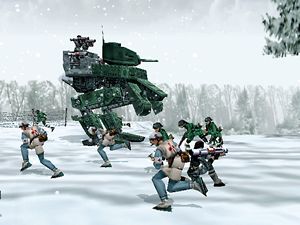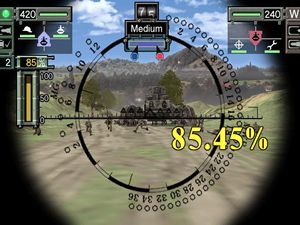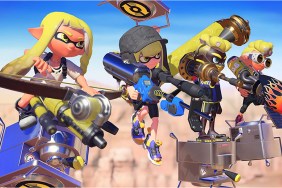Get the bleach – I’ve got ring around the Giant Mech!
World War II was indeed a horrible time in our history. Millions upon millions
died and the great potential for evil within mankind’s own heart was discovered.
To combat this awesome evil, weapons of mass destruction were created. Super weapons
such as submarines and atomic bombs came to the forefront of the war and became
key factors in combat. But the history books often forget to mention one of most
awesome secret weapons of WWII: the Giant Mech.
Luckily, historians over at Konami have uncovered the lost files detailing
WWII’s most top-secret weapon and, with the cooperation of the Amalgamated Nations
Office of Top-Secret, uh, Stuff, have produced the finest training simulation
for WWII mech warfare available to the public.
Okay, so maybe it didn’t really happen that way, but Konami’s PS2 strategy
title, Ring of Red, sure makes it seem like it did. Players will take
control of giant mechs to fight other mechs in an attempt to recover a stolen
anti-mech prototype and help end the conflict between North and South Japan.
Got that? I knew you would.
Ring of Red is a strategy game in the same vein as Front
Mission, with a series of turn-based strategic battles on a hex-based playing
field. Four types of mech grace the game with several types of soldiers acting
as support. Each of the four mech types are specialized in certain forms of
combat. Knowing how and where to setup battles to your advantage is definitely
the key to victory.
You’ll also need to be smart about the types of soldiers that round out the
team. Six types of soldier appear on the battlefield and a good player will
quickly learn the strengths and weaknesses of each. Each individual squad of
soldiers has their own special abilities. When on the battlefield, make sure
to keep your eyes peeled, since new recruits can often be found in villages
and cities. Deploying the soldiers’ offensive, defensive, and support capabilities
plays a crucial role in putting together a good mech unit.
Not only do you have to understand your units, you’ll also have to pay close
attention to the battlefield. Land conditions, weather and even the time of
day influence the effectiveness of your units. With a ton of things to consider,
Ring of Red will have your command brainwaves running on overdrive.
Don’t let this level of complexity scare you, though, because the game is
actually pretty easy to understand. Getting the hang of basic strategy and a
grip on how to run your army will only take a mission or two. The interface
may also look clunky at first glance, but it’s definitely easier to handle than
it looks. Not bad at all.
While the deep level of strategy and its relatively easygoing nature make
the game interesting, the super slow execution of your plans weighs the game
down. From mission to mission, game flows at a snail’s pace. You’ll start off
the mission by viewing your memoirs. Slowly but surely, the text scrolls across
the screen and there’s no way to skip it. From there, it’s on to the briefing
room to learn about the battle to come.
After you’ve assembled your crews and are familiar with all of the intelligence
on the mission, it’s time to go to war. You’ll deploy your units on a turn-by-turn
basis and engage the enemy in some down and dirty mech warfare. From there,
you’ll bounce down to the front lines to control all the action.
These one on one encounters are the heart of the game, but they tend to get
a little too bogged down in trying to be a sim. Players will usually have to
wait a while for their ammo to load, wait for their troops to get into position,
or just wait for their slow, lumbering mech to move a few steps. Unlike Kessen,
you can’t make decisions on the fly; once a decision is made, there’s not much
you can do. It’s especially frustrating if you’ve accidentally given the wrong
command, since there’s no way to cancel it.
Graphically, Ring of Red does nothing special. The mechs look pretty
nice, but everything else is a bit of a letdown. The soldiers have noticeable
edges and the textures in the fighting areas look dated. The power of the PS2
is weak in this one.
I also need to mention that the mechs don’t really feel like mechs at all.
The game could have substituted tanks for the mechs and nothing would have changed.
Sure, giant mechs make things better, but only if you actually get to use them
like big robots instead of gussied-up tanks.
As much as I love those oversized bastions of Japanese anime, I can’t say
this is a great game. Ring of Red offers decent strategy elements and
is easy to understand, but the gameplay crawls and may be a turn-off for even
the most hardcore strategy buff.

-
Mechs in WWII!
-
Deep strategy
-
Easy to understand
-
Feels slow
-
No room for mistakes
-
Graphics need more polish







